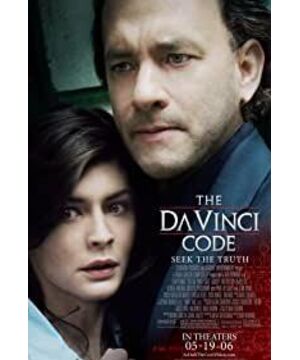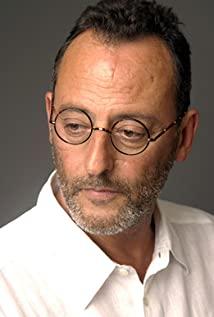Controversy about the film, and even the novel, in religion and history. With my superficial knowledge of Christianity and Western history, I cannot make any judgments at all. It's just that, from the first time I read the critical opinions about "The Da Vinci Code", I have always had a very funny idea in my mind-how a group of theologians went to argue with a novelist about archaeology, history, etc. Is this a scientific topic? Shouldn't this be in the realm of science? Since Copernicus, when did theology start to put its hands in the crotch of science again?
Hehe, I think these words will make many friends who believe in God angry or despised. But at least I can honestly say that I don't believe in God. This unbelief includes not only Christianity, Catholicism, Orthodoxy, etc., but also all those "gods" that exist in any religion. But on the other hand, I respect all those religious believers who have firm beliefs and practice them.
Every time I see some articles, it is said that a certain view or statement is wrong because it violates the teaching of a certain god. Or, so-and-so's writings were not written under the inspiration of gods or under the influence of heaven and man, so they must be fake works and so on. It always strikes me as extremely absurd—since God and man are two creatures that have absolutely nothing in common, or that God is not a creature at all. Then, why can one group of people use the name of God to judge, judge the words of another group of people, and even live and die? !
In "The Da Vinci Code", Dan Browns gave an explanation: As a pagan Emperor Constantine, in order to continue his rule, the empire should not be divided and used the power of religion. Here, I almost regard this great emperor as a cross-generational master of modern marketing - you see, he has completely castrated, integrated, and packaged the originally diverse and even contradictory Christian sects and teachings, forming a set of The plausible new religious theory, even history, that seems to be consistent with the original teachings, but also plausible, has been reshaped. Then, Jesus is no longer alone! This is a classic success story of a marketing master in today's Chinese market. However, the master is a master, and it must have come from it. The Emperor Constantine was able to use Christianity as a shell resource to successfully go public because he had a sword in his hand, money in his pocket, and a throne under his ass. This advantage is reflected in today's Chinese market. There are no two princes in the pockets, or he is a prince himself; he does not have a few monopoly CEO hats on his head, and he is embarrassed to say hello to people when he goes out.
In fact, this ability has been through the ages, regardless of whether it is Chinese or foreign, and people who know it can be found everywhere. To put it bluntly, it is nothing more than two words: deification. Back then, when Kong Zhongni was down and out, he said that one must have a right name in order to speak well. What do you mean? That is, you have to have a name that others cannot refute, and then you are qualified to say things. In the current language, it is called the right to speak.
It is easy for others not to refute. Soldiers, money and power, one thing is enough. But the name is too deep, and it is impossible to deal with all the three above. But if you find someone, package him as a god. Let him say what he wants to say, and the title will be complete. Therefore, when packaging such non-human creatures, it is best to find dead people. For example, as I just said, the old man deified Jesus, and Dong Zhongshu, the descendant of the Seven Fairies, deified the second child of Kong. Of course, there are also people who simply jump out and jump directly to the great god, such as the god of the world on the island to the east, and the brother of Jesus, surnamed Hong, from the Taiping Heavenly Kingdom. Later, people also learn to be smart. After all, the limitations of the dead are too great, and the living always quickly become dead. So, simply deify a group, a group of party members or even a race. This point, in fact, has a long history as much as deifying individuals. Look at how God's chosen people slaughtered aliens in the Old Testament, and how Hitler made the Aryans a "superior race".
Because he is familiar with God's "manufacturing" process, he even participated in it himself. Therefore, the creator of gods can never believe in gods. Historically, they are more inclined to believe in violence, power, wealth or themselves. And those believers who believe because of doctrine and experience, even without those created gods, will not affect their devout beliefs. Just like those believers who follow God before they become "God". Therefore, excluding those fanatics who have been fooled by the created gods, true belief is actually a different thing from God.
When it is really packaged as a "god", basically, it is not a human being. The character and beauty that everyone should have will be replaced by the cold "divine". Every staff member on the deification packaging production line will give the worst of their human nature to the "godhead" being packaged to the greatest extent - greed, ruthlessness, shortsightedness, cruelty... This is the original sin of deification, Because if it weren't for these greed drives, who would be so idle to bring a rotten zombie to the altar, and then force everyone to kneel and worship? !
There is never a shortage of wise men in this world. Muhammad said not to worship idols, and Sakyamuni said Buddha was not a god. Unfortunately, after they died, they were also deified. Their names are chanted by countless people, borrowed, to do evil, to plunder, to destroy, to destroy. Therefore, the wise are more sinful than mortals, and will never rest in peace. From this point of view, all deifications are anti-human, no matter what the original intention of deification was.
View more about The Da Vinci Code reviews










